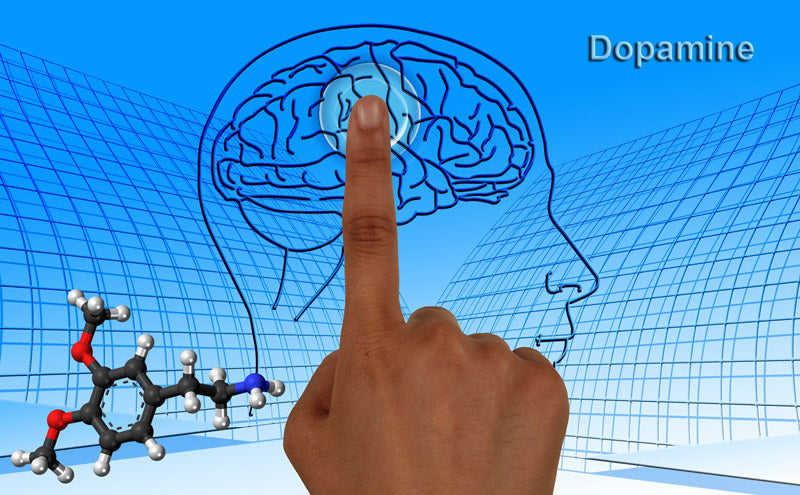Have you ever been confused about why alcohol affects you the way it does? You feel perfectly normal one moment and the next you’re suddenly the most bubbly, sociable person in the room. So, you keep drinking. After excessive consumption, you’re on the floor in a corner of the bathroom, wondering why everyone’s so mean to you. (This is not from our own experience, we swear). So, why is alcohol having this effect on your brain? Why does it have the ability to take control? To find out, we had a hard look at the link between alcohol and dopamine to find out what alcohol really does to your brain.
What Is Dopamine?
You already know what alcohol is so let’s start with dopamine. What is it and what’s its connection to alcohol? Dopamine is a neurotransmitter, a chemical that transmits information and signals between brain cells and then relays that information throughout your body. To put it simply, dopamine is responsible for much of the good we feel and can help regulate our mood, emotions, memory, sensations, and even body functions.
How Are Alcohol and Dopamine Connected?
Drinking alcohol triggers the release of dopamine in the brain which your body associates with many pleasurable things. After all, dopamine is released naturally through pleasurable activities such as exercising, eating, getting a good night’s sleep, listening to music, meditating, and having sex. When you first start drinking alcohol, your brain is triggered to produce more dopamine which is why you feel like you’re on top of the world. You’re overly happy, you love absolutely everyone, and you find yourself making all sorts of plans you’re never going to keep because why not? You feel great! Because you want to keep feeling this good, dopamine in your brain prompts you to continue drinking. The problem is your brain no longer feels the need to keep overloading you with dopamine so the dopamine production slows down. Now the dopamine responsible for your good mood is starting to plummet and it’s taking your mood with it. This is why you end up crying on the floor of the bathroom at the end of the night.
The Downfall of Dopamine
So, we’ve established that the decreased production of dopamine that comes as a result of drinking too much alcohol causes a downfall in your mood. However, dopamine is not the only thing responsible for your tears. At the same time that dopamine is working overtime in your brain, other brain chemicals that enhance your feelings of depression are hard at work. When the overload of dopamine in you brain starts to wear off, everything hits you at once. This is what makes alcohol a depressant.
Dopamine and Addiction

Unfortunately, with any substance that increases your level of pleasure there is a risk for addiction. Your brain starts producing an increased amount of dopamine with even one taste of alcohol. You do not have to be intoxicated for this to occur. The automatic association of pleasure and alcohol makes your brain permanently connect the two. Your brain doesn’t want you to stop drinking after a few drinks, even when your dopamine levels start to deplete. In fact, it’s very much the opposite. Both your brain and body are chasing that feeling caused by the increased level of dopamine and you are now essentially hooked. This is where fun night out runs the risk of leading to an addiction for some heavy drinkers while for others it has no effects at all. This depends on a variety of factors, including both gender and genetics. Studies show that men create an increased amount of dopamine compared to women which more than likely contributes to men’s increased likeliness to become addicted to alcohol over women.
How else does alcohol affect the brain?
The overproduction of dopamine isn’t the only way that alcohol affects the brain. There are several other parts that are affected, too, and they are responsible for other negative effects of alcohol that we haven’t mentioned.
Clumsiness – The cerebellum is the part of your brain that is responsible for balance, posture, and speech among other things. When alcohol is consumed, the cerebellum is affected. Your movements far less smooth and the likeliness that you will lose your balance much higher.
Drowsiness – Alcohol affects the medulla, or brain stem. The medulla is responsible for influencing body functions such as breathing, heart rate, and body temperature. It is also affected by alcohol which causes you to feel sleepy maybe even pass out. This can be incredibly dangerous and is part of the reason why excess alcohol consumption can be fatal.
Short Term Memory Loss – Alcohol affects the limbic system which controls emotions and memory so the loss of dopamine isn’t the only reason for your seemingly unwarranted emotional outbursts. This is also why you can’t seem to remember much of anything after excessive alcohol consumption.
Consuming alcohol can be a great time with the right people, in the right setting, and with the right frame of mind. We want to stress to be safe with your alcohol intake and to protect your body from the effects of alcohol as much as possible. Our RaveAid supplements are designed to not only to save you from the effects of a hangover but to also protect your body from potential damage after drinking excessive amounts of alcohol. RaveAid is meant to be taken before a night out to prevent damage and to help ensure healthy brain function. Our supplements were created with your health and safety in mind. We understand the effects that alcoholic beverages have on the health of your brain and body. We want to try to protect you from them as much as possible while still allowing you to get your rave on.
